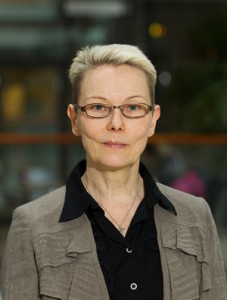A continuum of development over the years
The beginning of the year 2014 also marked the beginning of a new term for administrators. Undergraduate education largely followed its usual course. Teaching-related committees continued their work, with evaluations of operations and some changes in membership. Academic administration reviewed its processes, and the student feedback system and regulations concerning the Bachelor’s thesis were also updated. When groundwork is properly done and committed people join forces, work gets done!
Our teaching and teachers enjoy esteem
The University of Helsinki Teachers’ Academy, established in 2012, promotes the professional expertise of teachers, and has brought new inspiration to the University community. In 2014, the Faculty of Veterinary Medicine received three new Academy teachers: early in the year, fellowships were granted to university lecturers Mikael Niku and Anna-Maija Virtala, and late in the year, to Professor Mari Heinonen. These Teachers’ Academy fellows must also be applauded for their active contributions to the development of teaching in their home faculty. Another inspiring development was the launching of “pedagogic afternoons” at the Veterinary Teaching Hospital in February. The Hospital plays an important role in educating future veterinarians, and clinical practice is one of the most sensitive and challenging stages of their studies. A competent and teaching-oriented staff are able to create a training environment that feels safe.
The Faculty presents an annual award for teaching merits. The criteria for the award vary from year to year; this year the Faculty recognised a course that not only received excellent student feedback, but of all courses, was the one that improved the most the feedback received from the previous year. The award was given to the course in small animal surgery, and one of the course teachers is being offered the opportunity to participate in a pedagogical symposium in England next summer. The award was presented just before Christmas in the new Think Company facilities on the Viikki Campus, which offered a cosy and relaxed environment for our teachers’ meeting focusing on feedback to enhance learning.
Development and evaluation of the degree programme
Curriculum design took a giant leap forward with the inclusion of an introductory course in clinical production animal medicine to the third year of studies (3 credits); this course takes studies towards the goal of introducing the most important aspects of veterinary work at the Bachelor’s level and complementing this introduction with career skills at the Licentiate level. At the Saari Unit, students are familiarised with production animal medicine in practice. Eeva Mustonen presented the course in the VetEd Symposium in England in the summer. Moreover, the basics of diagnostic imaging were reorganised into a separate course to be completed during the third year of studies. It now includes practical diagnostics for x-ray and ultrasound examinations.
The working group for the development of clinical teaching has made continuous efforts over the past three years to develop the clinical year. New group members and the work done in previous years bore fruit, and at the end of 2014 the framework for the clinical rounds was agreed upon. Pathology and veterinary inspector traineeships were integrated into the clinical year, which also offers a somewhat greater variety of elective courses for students. In the autumn, a feedback session for 6th-year students was organised for the first time to provide them with the opportunity to discuss their experiences of their first summer practice. The students exchanged experiences about knowledge, skills and coping under the supervision of Faculty teachers and alumni.
The University of Helsinki had already in 2013 selected the degree programme leading to the degree of Licentiate of Veterinary Medicine as a sample programme for its audit , but the audit team visited the Faculty in October 2014. The audit team interviewed both teachers and students, who generally found the questions tricky. The outcome of the audit is still unknown as I write this, but the Faculty of Veterinary Medicine again hopes to receive concrete proposals for the further development of its quality management system.
Past efforts pay fruit
The year 2013 at the Faculty ended with a development seminar focusing on learning assessment. I am happy to say that at least two themes discussed in this seminar yielded results during the past year, namely veterinary professionalism and assessment of students’ previous knowledge. A working group appointed to discuss professionalism met three times during the year. New insights into this discussion were offered by Teachers’ Academy fellow Mikael Niku, who reported on a symposium on veterinary pedagogy held in Britain, and by Kirsi Sario, president of the Finnish Veterinary Association and member of the Faculty Council of the Faculty of Veterinary Medicine, who took great interest in the issue. Research collaboration on the assessment of students’ previous knowledge was launched between the veterinarians of the Equine Hospital and Post-doctoral Researcher Telle Hailikari from the Centre for Research and Development of Higher Education.
The student feedback system produced for the first time the following gratifying result: at least two-thirds of students in all years of study found the workload of each study year to be suitable. The Faculty has worked for decades to reach this goal, without forgetting that studies in veterinary medicine cannot be trimmed to the bone. Both the National Bachelor’s Graduate Survey and the LEARN survey that is used as a quality management tool at the University present the Faculty with the challenge of providing students with feedback that will enhance their learning.
Mirja Ruohoniemi
Vice-dean, undergraduate education
Faculty of Veterinary medicine
University of Helsinki
